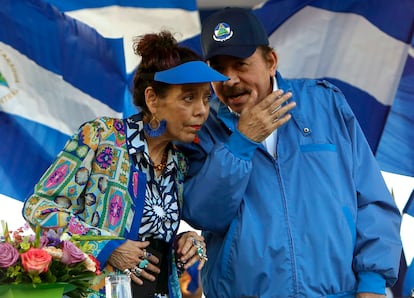Let’s stop funding Nicaragua’s dictatorial regime
Under the pretext of poverty reduction, disaster relief and small business support, international financial institutions have loaned at least $1.2 billion to the Ortega government since 2018

As dictator Daniel Ortega strips away human rights and withholds basic needs from the Nicaraguan people, international funding intended to support humanitarian objectives is instead subsidizing his efforts to undermine the rule of law.
Under the pretext of poverty reduction, disaster relief and small business support, international financial institutions including the International Monetary Fund (IMF), World Bank and Inter-American Development Bank have loaned at least $1.2 billion to the Ortega government since 2018.
The IMF alone disbursed nearly $540 million aimed at pandemic response and economic development in 2020, despite Nicaragua’s disinterest in abiding by regulations designed to enforce transparency. At the time, the Acting Chair of the IMF’s Executive Board praised the Ortega regime’s commitment to “strengthening governance and transparency, and tackling corruption.” Much of this funding has been channeled through the Nicaraguan Ministry of Finance, headed by Iván Acosta, who has been sanctioned by the US government for corruption.
Meanwhile, the humanitarian situation in Nicaragua has crumbled. Ortega and his wife and second-in-command, Rosario Murillo, have killed, jailed, and exiled their political opponents, eradicated independent media, and clamped down on civil society, shuttering hundreds of NGOs, schools, and churches.
The predictable result? A refugee crisis, displacing hundreds of thousands of Nicaraguan citizens and placing strain on the limited resources of neighboring countries.
As we seek to defund the regime’s infrastructure of oppression, we must pursue alternate mechanisms for aiding the Nicaraguan people, whether they reside in the country or are part of the growing diaspora
The Ortega-Murillo regime’s latest assault on democracy is shocking, but it did not come as a surprise. Over a year ago, I led my colleagues in introducing the RENACER Act, which was signed into law by President Joe Biden. This legislation empowered the President to restrict funding from global lenders like the IMF to Nicaragua’s government, curbing Ortega’s ability to suppress dissent and building pressure towards the release of political prisoners and the restoration of democracy.
While President Biden has escalated individual sanctions against Ortega and his cronies, the IMF and other international financial institutions have quietly continued to funnel money to Nicaragua’s authoritarian regime. The Biden administration has failed to persuade the IMF and other institutions to adopt formal measures prohibiting Nicaragua from receiving new credit until fair elections are held and improvements in the human rights situation are documented.
Even if these loans were going to good use, money is fungible. An extra billion in short-term spending means that Ortega and his co-conspirators have an extra billion for arresting Catholic clerics, raiding charities who provide critical services, and hosting Russian troops in their military bases. These loans serve to enrich Ortega’s inner circle while bringing macroeconomic stability and international legitimacy to the regime, undermining the coercive power of US sanctions.
Amid swirling global crises, from climate-driven natural disasters to Putin’s war in Ukraine, why would these institutions trust Ortega with their money? The answer is complicated. Heartbreaking socioeconomic conditions in Nicaragua continue to demand international attention. Due to the neglect of its corrupt leadership, the country lags woefully behind on most development indicators. And even as he flouts international law, Ortega has never missed an interest payment.
This demonstrates a key reality of Daniel Ortega’s rule. He doesn’t respond to rhetoric, risk, or gamesmanship. However, he is highly sensitive to his cashflow.
President Biden should take full advantage of this by invoking powers established by the RENACER Act to exercise oversight at international financial institutions, using the voice, vote and financial sway of the United States to cut off external funding to the Nicaraguan government. The Administration should also review Nicaragua’s privileged access to US markets through CAFTA-DR and determine whether the value of our imports outweighs the cost of propping up Ortega.
These actions, along with the continued application of targeted sanctions against individuals supporting the Ortega-Murillo regime, must be presented alongside clear conditions for their reversal: the release of political prisoners and the restoration of free elections and human rights.
As we seek to defund the regime’s infrastructure of oppression, we must pursue alternate mechanisms for aiding the Nicaraguan people, whether they reside in the country or are part of the growing diaspora. We should target humanitarian assistance through independent entities like the World Food Program and provide Latin American allies with desperately-needed resources for migrant processing and resettlement. Finally, the US must demonstrate unambiguous support for the exiled opposition movement in their hope to return to a free, prosperous and democratic Nicaragua.
U.S. Representative Albio Sires (NJ-08) has served in Congress since 2006. He chairs the House Foreign Affairs Subcommittee on the Western Hemisphere, Civilian Security, Migration and International Economic Policy, and was the lead sponsor of the NICA Act (2018) and the RENACER Act (2021).
Tu suscripción se está usando en otro dispositivo
¿Quieres añadir otro usuario a tu suscripción?
Si continúas leyendo en este dispositivo, no se podrá leer en el otro.
FlechaTu suscripción se está usando en otro dispositivo y solo puedes acceder a EL PAÍS desde un dispositivo a la vez.
Si quieres compartir tu cuenta, cambia tu suscripción a la modalidad Premium, así podrás añadir otro usuario. Cada uno accederá con su propia cuenta de email, lo que os permitirá personalizar vuestra experiencia en EL PAÍS.
¿Tienes una suscripción de empresa? Accede aquí para contratar más cuentas.
En el caso de no saber quién está usando tu cuenta, te recomendamos cambiar tu contraseña aquí.
Si decides continuar compartiendo tu cuenta, este mensaje se mostrará en tu dispositivo y en el de la otra persona que está usando tu cuenta de forma indefinida, afectando a tu experiencia de lectura. Puedes consultar aquí los términos y condiciones de la suscripción digital.








































